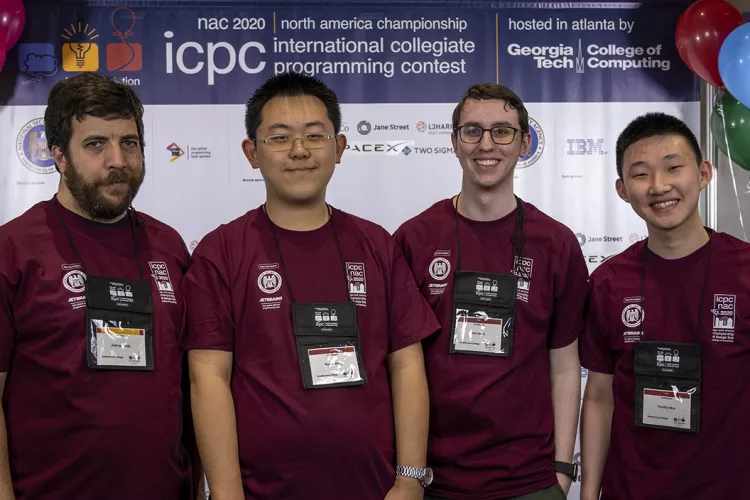Competitive Programming Team Shines at North American and World Competitions as Lone Liberal Arts School

Associate Professor of Computer Science Josh Brody with team members (from left) Runze “Henry” Wang ’22, Jay Leeds ’23, and Timothy Mou ’23.
It’s extremely rare for students from liberal arts institutions to compete at the highest level of the Intercollegiate College Programming Contest (ICPC). But that didn’t deter Swarthmore’s team.
Led by Jay Leeds ’23, Timothy Mou ’23, and Runze “Henry” Wang ’22, the team finished fourth at the North American Championships (NAC) and the World Finals Invitational (WFI) this year. In both cases, they competed as the lone representatives of a liberal arts college.
“Their performances were spectacular,” says Associate Professor of Computer Science Josh Brody, the team’s adviser. “I view the accomplishments as similar to a Swarthmore sports team doing well against Division I competition.”
The students earned the bronze medal at the NAC, held online in August. Leeds, an honors economics and mathematics major from Austin, Texas; Mou, an honors computer science and mathematics major from Peoria, Ill.; and Wang, an honors computer science and mathematics major from China, solved six problems in three-and-a-half hours, topping 44 other teams.
The team’s performance at the 2020 NAC qualified it for this year’s WFI, a highly competitive event held virtually in October that featured more than 50 of the best teams from around the world.
Based on its performance in this year’s NAC, the team earned a spot in the next WFI, scheduled for November 2022 in Dhaka, Bangladesh (pending COVID-19 protocols).
Reflecting on the rarity of the team’s achievement, Leeds says that liberal arts schools tend to have fewer students to draw from for ICPC competitions. But he and his teammates brought extensive experience with programming competitions dating back to high school.
“All three of us have developed our own individual specialties,” says Leeds, “and, as a result, we were all able to make valuable contributions to the team's World Finals performance.”
The invitational in October marked the team’s first appearance on the world stage. The students faced a more difficult set of seven programming problems, in addition to not being able to practice together extensively, with Leeds and Mou being in the U.S. and Wang in China.
But they once again outpaced all but three teams, ending up as the top-ranked team from North America. Key to that performance were the students’ complementary skill sets and approach to which problems to prioritize.
“Early on in the contest, I decided to work on a problem that involved a lot of implementation, as it was unlikely that many teams would try to solve that first,” says Mou. “We were able to finish this problem much earlier than other teams, which gave us an advantage.”
“There was no sign of which problem should be solved next based on the scoreboard,” adds Wang. “I used my intuition to find a problem that was worth attempting, and sometimes making a choice required courage and determination.”
The performance reflects the strong team dynamic the students have developed over the past two years. “I feel incredibly lucky to have teammates as experienced, as talented, and as committed to our team’s success as Henry and Timothy,” says Leeds.



